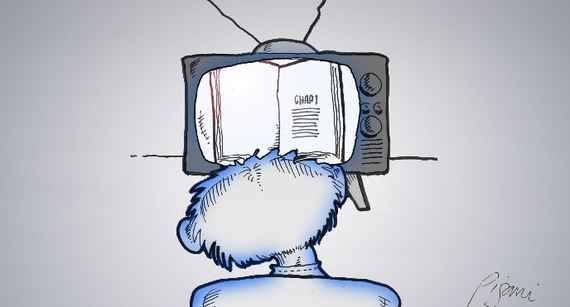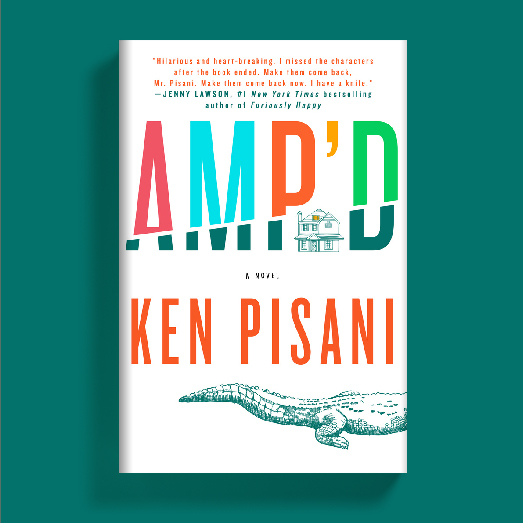They say this is a new "golden age" of television, and whenever "they" say something so definitive we should be very skeptical—especially since TV's first "golden age" gave us shows like Our Miss Brooks, Fibber McGee and Molly, and Heinz Studio 57, an anthology series about ketchup. But let's concede the point, if only so I can continue writing about it.
The New York Times has posed the question, "Are the New 'Golden Age' TV Shows the New Novels?," while Esquire has written "[T]he TV boxset is the 'great literary novel of its day.'" Bill Moyers has compared David Simon's hardscrabble take on Baltimore in The Wire to Charles Dickens's depiction of "the smoky mean streets of Victorian London." And I'm pretty sure another smart guy said something smart about smart TV writin'. The consensus seems to be that television has gotten more literary, regardless of the fact that most of us are watching Dancing with the Stars.
Book adaptations have always enjoyed a place on American television, as far back as Peter Pan in 1955‐really just a broadcast of the stage play, but since it earned a then-record audience of 65 million viewers, it went on to be restaged by NBC in 1956 and 1960. Seeking to capitalize on that alliterative success, ABC gave us Peyton Place in 1964. As evidence that books at this time were so highly regarded, the occupation of matriarch Constance MacKenzie, a clothing-store owner in the novel, was changed to a bookstore operator in the series, while her daughter Allison, played by Mia Farrow, "liked to spend her time reading books," according to Wikipedia. Yes, it's hard to imagine how they squeezed 514 episodes of soapy betrayal and off-camera sex out of these suburban bookworms.
By the seventies literary source material was seen not as fodder for series but the very special "mini-series": too long for a TV movie but just enough for an "event." Limited series based on novels Rich Man, Poor Man and Roots demonstrated that American viewers still enjoyed seeing books spring to life, but only if it was over quickly. In the eighties, Shogun and The Thorn Birds proved even that limited attention span was dwindling—to five and three episodes respectively—although that could also likely be attributed to an audience's pain threshold for Richard Chamberlain.
It wasn't until the nineties that TV began to skip the adaptation process entirely and create series with rich, complex characterizations and the sometimes-meandering storytelling of good fiction. The show that changed everything was The Sopranos, on the surface the story of a mobster in therapy with mommy issues, but in reality so much more—a commentary on American life in slowly unfolding, extraordinary detail populated with rich, unlikable characters (not to mention the language, violence, and nudity that became HBO's hallmark). Creator David Chase, a veteran TV writer, has said that The Sopranos was a reaction away from everything he had done as a television writer until then. "I was so tired of episodic television. Did I want to make a grand statement? No. But I did want to make films in which the audience had to pay attention." Just like that book you can't put down.
The Sopranos was followed on HBO by Six Feet Under and The Wire; soon AMC got into the game with Breaking Bad, a tale of good turning evil as compelling as the best crime fiction, and Mad Men, a chronicle of the same haunting mid-century ennui once explored by Updike and Cheever. Spurred by that critical success, other outlets continued to develop original series with literary ambitions, including The Americans, as complex as any cold war thriller, Rectify, so small and filled with yearning it might as well be poetry, and the ruthless and darkly funny Fargo. Television was not just exploring new ideas and worlds apart from doctors, lawyers, and beat cops, but allowing those stories to blossom slowly across a sprawling, serialized canvas.
Which begs the question: why didn't this happen sooner? Wouldn't those same audiences riveted to their television sets for a week of Roots and Lonesome Dove have yearned for the more expansive storytelling of the twenty-first century, or had their brains grown flabby from years of exposure to Bonanza?
The easy answer might be the looser standards of cable and pay TV that allowed these new ideas to exist. (And don't shortchange the power of nudity.) The Sopranos was originally shopped to FOX, and while that upstart network was known for taking chances, it's impossible to imagine the brutal, and even darkly funny series that earned so many accolades surviving the development process of broadcast television, much less its standards and practices. Throw in skittish advertisers, and a network version of The Sopranos might have had more in common with Analyze This, about which the IMDb Parents Guide cautions "Sex under the covers—no nudity" and "Comic rough-housing including Billy Crystal getting thrown in a shark tank." The only argument when that version ended might not have been "Is Tony dead?" but "What took so long?"
Sign up for more essays, interviews and excerpts from Thought Matters.
ThoughtMatters is a partnership between Macmillan Publishers and Huffington Post
But the real reason it couldn't happen sooner is likely syndication. In a pre-VHS, DVD, and streaming era, a first-run television series single revenue stream remained those commercials we now fast-forward past on our DVRs. And that profit wasn't always enough; most shows were deficit-financed by the networks and would only pay off (handsomely!) if they could stay on the air long enough to generate the mythical one hundred episodes necessary for syndicated reruns to play later, forever, alongside I Love Lucy, which will still be running after Armageddon. And the ingrained industry belief then was that serialized storytelling didn't work in syndication: if you fell asleep in front of your late local news and woke up to The Rockford Files, you were more likely to continue watching a stand-alone episode than if you had to have followed a series- or even a season-long story arc. There was the added benefit that programmers of reruns didn't have to worry about scheduling episodes in order; face it, all our jobs would be easier if they consisted of pieces we just had to drop randomly into place before heading to the bar to watch the Lakers lose.
(Yes, there were shows that broke that mold: Twin Peaks, to name one. But despite its initial buzzy success, a steady ratings decline in season two only confirmed the network mantra that slower paced serialized storytelling did not support casual viewing. As proof that it was ahead of its time, a new Twin Peaks limited series will premiere on Showtime in 2017. It also proves that it's easier to glom an old idea than to think of a new one.)
Despite the similarities, television and prose fiction remain more different than alike, largely because TV is a collaborative medium. While the best aforementioned series represent the singular vision of the creator and showrunner, executing those rich, dense narratives takes a room full of writers and a team of directors—not to mention the actors portraying the characters and the numerous artistic and technical positions to create worlds. Also, agents and craft services.
A recent highly acclaimed exception was the first season of HBO's True Detective, a limited series created and written in its entirety by novelist Nic Pizzolatto, with all eight episodes directed by Cary Joji Fukunaga. It was an unprecedented approach to television led by two visionaries in singular collaboration... and the critical failure of season two points to both the limitations of novels and television's shortcomings. In an interview on KPCC's The Frame, HBO President Michael Lombardo admitted, "The first season was something that Nic Pizzolatto had been thinking about, gestating, for a long period of time. (Years, in fact.) We had huge success [and I said] 'Gee, I'd love to repeat that next year.'" But it was simply impossible for Pizzolatto to match the quality of that first effort given a much shorter time span to do so, a tale familiar to any novelist asked to follow up his or her bestselling debut (we should all be so lucky) with the next one quickly, completely disregarding the effort devoted to the first one.
In addition to Pizzolatto, the list of novelists currently writing for and creating TV series includes Noah Hawley (Fargo), Joe Weisberg (The Americans), Ali Liebegott (Transparent), D.B. Weiss and David Benioff (Game of Thrones), and two of my personal favorite literary Jonathans, Ames (Blunt Talk), and Tropper (Banshee). And novel adaptations can be seen with every turn of the dial, although if your television still has a dial you're probably missing these streaming offerings: Netflix's political thriller House of Cards, based on the Michael Dobbs novel that first begat the (arguably superior) 1990 BBC version, Philip K. Dick's The Man in the High Castle on Amazon, and Stephen King's 11.22.63 on Hulu.
Television continues to look to the novel for future inspiration. Among projects in development are Neil Gaiman's American Gods, Margaret Atwood's MaddAddam trilogy, and to no one's surprise, more Stephen King—who's had fourteen books turned into series or miniseries (Salem's Lot twice)—with The Mist coming to Spike. While these are the so-called "high concepts" that you can pitch in a single sentence to a television executive or a toddler, television still makes room for the kind of storytelling that was once solely the domain of the literary novelist, including Showtime's upcoming adaptation of Gary Shteyngart's Super Sad True Love Story, a drama "about a middle-aged bookish man confused by a technology-centric society who finds himself in a relationship with a young materialistic Korean-American woman." It's hard to imagine that pitch gaining much traction in the era of Dallas and Dynasty.
Fifty years from now, might there be a new "golden era" of television stuff being beamed directly into your brain, and if so, will there still be novels to influence it? As long as we're not still watching Dancing with the Stars—unless it's a ballet of actual luminous gaseous bodies we're enjoying up close in our teleporters.
A member of the Writers Guild of America West since 2003, Ken Pisani writes for film and television. His debut novel, AMP'D, is just published by St. Martin's Press in May, and Ken will be waiting by the phone for those adaptation offers to pour in.
Read more at Thought Matters. Sign up for originals essays, interviews, and excerpts from some of the most influential minds of our age.


